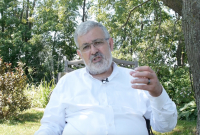Support strong Canadian climate journalism for 2025
News that a public consultation on systemic racism in Quebec would finally be underway in September — after repeated requests for one by representatives of Quebec’s Black, Muslim, and First Nations communities — has been met with a bevy of reactions.
They range from cautious optimism, to skeptical cynicism, to, finally, outright hostility and resentment at the idea.
Former Parti Québécois (PQ) MNA, minister, and leader of the opposition, Bernard Drainville (who did his fair share of stoking the flames of intolerance in 2014 when he introduced the infamous Charter of Quebec Values and its much-maligned and in-the-end defeated cafeteria-style secularism) took to Twitter to state that, “Questions connected to issues of discrimination I agree with. There are many and we must solve them. But a racist system in Quebec, it doesn’t exist.”
Journal de Montréal columnist and freelance journalist Lise Ravary, in agreement, tweeted this: “Everybody would have been ok examining racism. It's the systematic part that's irksome and untrue. The system is not racist. Individuals are.” Her Journal colleague Mathieu Bock-Côté referred to the consultation as “Quebec bashing made in Quebec” in an August column.
The PQ minced no words, referring to the Liberal government’s announced consultation as “putting Quebecers on trial” and urging “the government to put in place concrete ways to combat racism,” implying that a consultation would be both an embarrassing and fruitless exercise.
Characterizing the proposed consultation as a “trial” points to how the attempt to study and hopefully rectify systemic wrongs is perceived as a broad condemnation of all Quebecers as inherently racist and xenophobic. This is what gets most Quebecers’ backs up against the wall.
Quebec’s unique linguistic and socio-political history and position in Canada as a linguistic minority living and existing within a larger English-speaking majority places it in the redundant (and often exhausting) position of always having to see itself and defend itself in relation to others; forever juxtaposed against the larger political and linguistic framework of the Rest of Canada (ROC) and its menacing, all-encompassing power.
Discussions of race, racism (systemic or otherwise), xenophobia, secularism and religious intolerance can’t seem to take place in Quebec without politicians and op-ed pundits derailing the conversation for fear that these discussions immediately provide effortless ammunition to those who seek to disparage Quebecers.
And the conversations do provide this ammunition.
A history of "Quebec bashing" and its consequences
“Quebec bashing” is very real and routinely deployed by English-language publications across Canada who neither understand nor care to understand the intricacies of Quebec identity politics and how they shape the daily public narrative. As far back as 2002, Robert McKenzie, a Quebec National Assembly reporter for the Toronto Star for 40 years, spoke of the intense pressure English journalists in Quebec faced from management to report on stories that “made Quebec look bad to the rest of Canada, whether they were true or not.”
More recently, who can forget a Maclean’s op-ed penned by McGill University’s former director of the Institute for the Study of Canada, Andrew Potter? (He resigned after the public backlash.) Potter described Quebec as “an almost pathologically alienated and low-trust society, deficient in many of the most basic forms of social capital that other Canadians take for granted.” Despite nothing substantiating those offensive and unfair claims, the piece still managed to see the light, prompting Quebec Premier Philippe Couillard to lambaste it and Bloc Quebecois MP Xavier Barsalou-Dorval to refer to it as “Quebec bashing” and “Quebecophobia.” The same publication had been blamed by Quebec’s Press Council for a “lack of journalistic rigour” following a 2010 headline that referred to the province as the "most corrupt" in Canada.
There was also a storm over Jan Wong’s Globe and Mail editorial, written only three days after the 2006 Dawson College shooting, where she linked three Quebec school shootings to the alienation that non pure laine Quebecers felt after a “decades-long linguistic struggle,” essentially blaming French Quebecers’ desire for the preservation of their language for creating mass murderers.
Fear of “Quebec bashing” — however real — is preventing an honest discussion on issues of racism.
In addition, through the prism of Quebec history and nationalism, many French Quebecers continue to see English Canadians today as the colonizers and themselves as the colonized. This makes it inherently impossible for the former to see themselves as being in a position of power (even though they clearly currently are in relation to all linguistic, religious, and cultural minority groups in Quebec) and therefore unable to see themselves as being guilty of holding the upper hand in any possible systemic discrimination.
How can one be both the oppressed and the oppressor? This distorted and no-longer-accurate image of themselves as victims makes them defensive and eager to stand up for themselves.
In other words, the fear of being perceived as racist by the ROC, and the fear of freely giving ammunition to the ROC to see Quebec as more racist than everyone else makes them particularly vulnerable to populism, incites them to circle the wagons, and is the main cause of openly hostile reactions to a public consultation on racism. Within that national context, an honest and much-needed discussion about racism within Quebec can no longer be viewed objectively and fairly because it suddenly becomes both a public liability and a personal affront.
In my former life as a web editor, and later, news director with TC Media, I often moderated comments on the many Quebec English- and French-language weekly papers under my management. While internet comments are often to be avoided, they do, nonetheless, provide a realistic gauge of the public’s reaction to a news event. Valid criticism of systemic racism and discrimination would repeatedly and dismissively elicit denial or accusations of Quebec bashing by a disturbing number of readers, even when absolutely none was present.
In a recent interview political scientist Michele Sirois argued that systemic racism doesn’t exist in Quebec because we never had a slave trade, and in a co-written op-ed in Le Devoir Sirois argued that a consultation on systemic racism encourages an “ideology of victimhood.” This continues that tradition of denial.
Many political observers have astutely noticed that one rarely sees accusations of “Quebec bashing” lobbed against French-speaking Quebecers who publicly voice concerns or share embarrassing truths. Instead, they are accused of being a “colonisé” (a colonized Quebecer without a discernable Quebecois national identity and therefore siding with English interests).
English-speaking Quebecers and Quebecers whose maternal language is neither French nor English, on the other hand, are all too often perceived as having ulterior motives and being in bad faith when they express valid and fair criticism of Quebec. This has prompted many to question who has the unspoken right to criticize and whether there’s a double standard in place that subconsciously favours French Quebecers and deems their concerns as inherently more legitimate.
When Journal de Montréal columnist Mathieu Bock Côté wrote a French-language op-ed that referred to renewed attempts to teach Quebec history that would include the harm done to Indigenous communities by French and British colonization as “collective guilt” imposed on schoolchildren, and described an indifference to Quebec independence by Quebecers as “collective suicide,” Montreal Gazette columnist Dan Delmar was right to question whether such offensive conclusions could have been written in a mainstream English publication.
Case in point, when an “outsider” like Andrew Potter wrote his equally hyperbolic and disdainful English-language piece a few months ago, the public backlash was quick and rife with consequences for the author.
Time and time again, I’ve seen justified criticism of Quebec and sincere attempts to solve issues affecting the province being derailed by unfair accusations of “Quebec bashing”, which only aim to shut the conversation down and placate those unwilling to see reality.
It's time to stop placating and start tackling problems
The irony is palpable, because Quebec’s racism problem is no bigger a problem than it is in the rest of the country. Recent studies and events repeatedly confirm that racism is on the rise across the country. Racial profiling, routine carding of black youth, excessive police violence, increasing Islamophobia, and ever-emerging anti-immigrant hate groups are most certainly not the exclusive domain of Quebec.
Having acknowledged that, however, it’s time to stop placating and start tackling. The failure to truly integrate visible minorities within Quebec’s still largely homogeneous society is not accidental (or “marginal” as some French-language pundits have implied). It’s systemic and needs to be rectified. Results of the 2006 Statistics Canada census revealed that Quebec had the highest unemployment rate for immigrants at 17.8 per cent, well above the national averages and also significantly higher than for immigrants in any other province.
A 2012 situation test carried out by the Quebec Human Rights Commission found that corporate recruiters given résumés identical in everything but name were 72-per-cent more likely to call “white” names (English- and French-speaking Quebecers) over those that sounded African, followed by Arabic and Hispanic names. The same commission found that in Quebec “in 2015, racialized people had an unemployment rate of two to three times that of non-racialized people. The situation persists across all levels of education, and is of even greater concern in light of intersectional factors like gender and period of immigration.”
In fact, since 2009, the Quebec Human Rights Commission has felt that “these issues were sufficiently important for society as a whole to feel concerned by them” and has questioned why so many if its recommendations have gone unaddressed despite reliable data documenting that racialized people, especially African Canadian and Aboriginal people, experience systemic discrimination.
Only five out of 125 members of the Quebec National Assembly are from racialized communities. Only four out of 103 City of Montreal councillors are racialized, even though these communities account for 30 per cent of the city’s population. Of roughly 2,400 active firefighters now working for the City of Montreal, only nine are black. After the Quebec mosque shooting, despite overwhelming and moving displays of public solidarity, hate crimes in Montreal actually spiked.
We can argue that Quebec’s racism problem isn’t necessarily much bigger than the rest of Canada’s, and while this is true, it would do absolutely nothing to solve a problem that exists and deserves to be tackled. Despite some people’s reticence about its “systemic” nature, a strong majority of Quebecers do believe that racism is a serious issue, according to a recent poll.
The official letter requesting a public commission on systemic racism in Quebec was jointly written last year by Suzie O’Bomsawin, an Abekani activist from Odanak; Emilie Nicolas, president of Québec Inclusif (a lobby group for an inclusive society); Haroun Bouazzi, president of AMAL-Québec (Arabs and Muslims for a secular society); and Will Prosper (filmmaker and spokesperson for community group Montréal-Nord Républik). It was co-signed by about 45 Quebecers, among them Charles Taylor and Gérard Bouchard, who co-led Quebec’s 2008 Consultation Commission on Accommodation Practices Related to Cultural Differences. The letter was published simultaneously in both English and French.
As a Quebec writer who's written on these issues often over the years, and is convinced of the need for a commission, I, too, was one of the original co-signatories. There is an obvious and pervasive problem with diversity and representation in Quebec — a problem that needs to be tackled honestly and openly.
The people, like me, who demand a public commission on systemic racism aren't motivated by disdain for Quebec. We're motivated by our love for it.
Once a public consultation is indeed underway in September, will certain Quebec bashers in the ROC wrap themselves up in a blanket of fake moral superiority and point to it as proof that Quebec is more racist than the rest of Canada? Absolutely. But that’s no reason for Quebec not to go forward with one.
Systemic racism in Quebec deserves to be discussed outside of the tired old knee-jerk reactions of French-speaking Quebecers thinking this is a political ploy to embarrass them and make them look bad. It’s a bizarre form of navel-gazing that benefits no one in the long run – least of all the majority of Quebecers who aspire to the kind of society this type of consultation would further along.
Quebec, like the ROC, has a problem with systemic racism. Instead of looking at the decision to have a consultation as a zero-sum proposition where Quebecers can only lose, or indelible proof by some biased observers across Canada that it’s somehow worse in Quebec than it is elsewhere, the ROC should be looking at the consultation as an example of how all of Canada should openly be tackling what threatens to only become a bigger problem if allowed to fester.
You can only truly tackle the problems you acknowledge, not the problems you deny.
Quebec's public consultations on systemic discrimination and racism are slated to take place in September and October, concluding with a public forum in November.






Comments